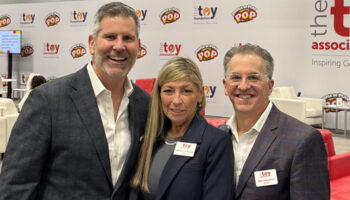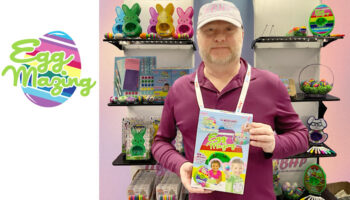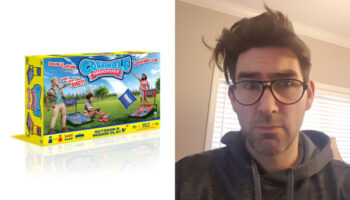Waddingtons Games Remembered: From early days and espionage to Hasbro and beyond

Thank you for joining me – all four of you! We’re approaching the 30th anniversary of the sale of Waddingtons Games to Hasbro. That was announced on 30th November, 1994. Today, we’re going to talk about everything from the Secret Service to controversial inventor deals; from early embezzlement to the success of the Cluedo TV show… So! Let’s find out who’s round the table: Amanda, please would you introduce yourself?
Amanda: Thank you for inviting us, Deej! I’m Amanda Latchmore, formerly Watson. Victor Hugo Watson Junior was my dad. Norman Victor Watson was my granddad… And Victor Hugo Watson Senior was my great-granddad.
Perfect! And for the uninitiated, the name Watson is THE family name associated with Waddingtons. I mean… Waddingtons was on all the products, but Watson is the dynasty that drove it. Is that fair to say?
Amanda: I think so, yes. John Waddington founded the printing business originally – right here in Leeds in the UK. When the company got into a bad state, my great-granddad said to the directors, “Give me six months and I’ll get it on its feet.” He was a foreman there at that time, but he’d actually come from humble origins and really worked his way up through the company.
It’s worth saying: it isn’t entirrrrrrrely clear when Waddingtons was founded: I’ve got it as 1897, but it was clearly up and running by 1898. Just to give that context: 1898 is about 10 years after Jack the Ripper last struck! So it’s a very old company. But Waddingtons didn’t make playing cards or games at that point, did they?
Amanda: No, they printed material for the theatre: posters, tickets, programs.
And Alistair, you were telling me earlier that John Waddington got into a spot of bother… He was embezzling money? Let’s introduce you on that sinister note! Who are you?
Alistair: I’m Alistair Graham, the son of Beric Watson. Beric worked in various roles for Waddingtons and ended up running Waddingtons Games in the 1980s. So I’m Amanda’s cousin… And I’m embezzling money from Mojo Nation!

Ha! Well… Ha! Embezzlement’s fine so far as it goes! The real money’s in blackmail, though. “What the Butler saw!” You were telling me what happened to John Waddington…
Alistair: Yes. As I recall being told, he’d taken on some apprentices and was getting a government subsidy for them. But the apprentices didn’t exist; he was pocketing the money. So maybe we hear less from John Waddington in the story than we might because he was sacked by the board quite early on.
Ah! Got it; makes absolute sense. Let’s introduce the rest of the table in one go… Claire?
Claire: Hi! I’m Claire McKenzie, formerly Claire Palmer. I worked with Alistair’s dad, Beric, for 10 years until he passed away – far too young… Later, I was involved throughout the Hasbro takeover. Then I carried on as PR manager after Hasbro took it over. I took voluntary redundancy in 2000 and started my own PR company.
Perfect. And Maggie?
Maggie: I’m Maggie Graham. I did Waddingtons PR for a while. And I’m Alistair’s wife – the daughter-in-law of Beric Watson.
And Beric was the middle of the three brothers, right? Victor Junior, Beric and John… But let’s not jump ahead! I’m putting us down in the early 1920s. John Waddington started the eponymous company, but Victor Watson Senior is running it with his son Norman… And over the first twenty-odd years, it’s become nationally known. But why is that? Why’s it so successful?
Alistair: It was one of the first printers in the north of England to develop photographic colour separation for printing. They also invested in the latest offset-lithoprinting machines. That was a technology that used a printing-plate design, and ink that repelled water. So you wet the plate, then inked it. The ink only adhered to the drawn image. Basically, it let you print more-detailed images – in colour… And faster. They also had great success making playing cards and, in the 1930s, Waddingtons also began to invest in making carton packaging and jigsaw puzzles before it looked at games.

So technology gave Waddingtons an early edge – and they kept up with the changes. And that helped when they wanted to start making playing cards?
Amanda: Yes. Making playing cards is quite a specialist part of printing. I think there were only two other printers in the UK that did it at that time because it has to be so exact. All the backs have to look identical…
Claire: They have to feel a certain way too… Glide off the pack when you deal – but not go everywhere when you spread them out or shuffle.
Alistair: My dad told me one reason why Waddingtons did so well with cards. It was because they developed a bitumen liner. That meant that – even if you held the playing card up to the light, you couldn’t see through it. The bitumen liner gave it a security aspect that made it very popular with gambling casinos.
And on this, I want to introduce a guy that illustrates something really amazing later… Bernard Westall. Bernard Westall was the Managing Director of a printing company called De La Rue. Not to be confused with Deliveroo… Or Danny LaRue! “I’ve been in the business for 45 YEARS!”
Claire: Ha! In all these years, I never noticed that similarity!
Well, it’s not particularly helpful connection I’ve made there! Ha! But De La Rue is still going today; still printing British banknotes… Back then, though, they made playing cards – and tried to sue Waddingtons for copyright infringement on the ace of spades!
Amanda: That’s right. It didn’t come to anything because when the judge saw enlargements of the two designs, he said they had many differences.

Right. But at a glance, they might look passingly similar because customarily – as you know – the ace of spades has a very ornate design; it’s usually got one large pip…
Maggie: Does anyone know why?!
Well, it used to be normal-sized. But the ace of spades tended to be on the front of a newly made deck… Now, to show tax had been paid on playing cards, people used to put a stamp mark right on the front card! So those ornate designs are a nod to that. Anyway, we digress! Waddingtons start making playing cards. They’re a hit?
Amanda: They are. They ship them all over the world… They also realize that there’s an opportunity to print packs with really stunning artwork – the Beautiful Britain cards.
Alistair: Because as well as having the technology to make great cards, they had a skilled work force to make great artwork. Obviously, this is a long time before digital! But Waddingtons had these highly qualified finishing artists to do hand-painted, beautiful designs… So a lot of creativity existed in the Waddingtons Studio, and they did a lot of prototyping to help win new business. It was an ideas hub and an artists’ studio.
And that would explain the success they had with cigarette cards as well…
Claire: Cigarette cards! I’d forgotten!
Yes, it’s quite shocking to think that cigarette packs used to come with beautiful, collectible pictures… Sports teams, airplanes, ships, cars, trains, historic figures – you name it. So cigarette cards come to our story in around 1932 – and they really help with the finances at Waddingtons. Arguably, that puts them in a better position to take a chance on their first game. Which was what?
Claire: Lexicon. That was around 1933… It came with a pack of alphabet cards – which were made the same way as a normal pack of cards – but it was sold as a very simple spelling game. Each letter card was worth a different number of points. Players held 10 cards each, I think, in their hand. They had to spell words, get rid of cards and score points.
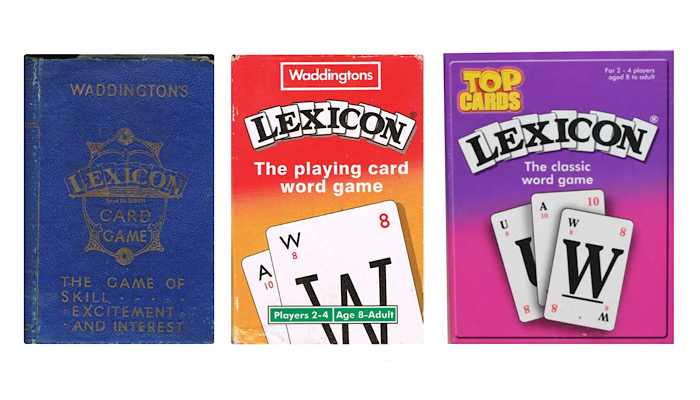
Perfect! Lexicon is the invention of a writer called David Whitelaw… But it doesn’t do so well! Sells a few hundred copies a month. And when Victor Senior and his son, Norman, see the poor sales, they do something quite radical: they upgrade the packaging – and raise the price! What difference does that make?
Claire: Huge! They start selling thousands a week. Just as importantly, Lexicon opens the door to conversations about Monopoly in the UK… Because, by that time, Parker Brothers had launched Monopoly in America – but no one was doing it over here. So Waddingtons made this transatlantic phone call that everybody talks about now…
Because?
Claire: Because that was still very rare in those days. It was the first transatlantic call Waddingtons ever made, and it was the first transatlantic call Parker Brothers had ever taken. But yes, Waddingtons telephoned Parker Bothers to promote themselves as game makers. And Lexicon doing well meant Waddingtons had a bargaining chip on that call…
Oh, I see! Waddingtons wanted to be able to say to Parker Brothers, “We make games. We’d like to do Monopoly in the UK!” And it was Lexicon’s sales that let them do that?
Claire: Exactly. Because someone in the family had played Monopoly in America when they were over there. When they came back, they said to Victor, in effect: “You’ve got to seriously look at this game because it’s all over America.” At first, I think, Norman Watson played it on his own – as though he was playing against other people…
Amanda: That’s right! In fact, he spent three consecutive nights playing it on his own – as if he was all of the players. And he reported back on it very favorably. So Parker Brothers and Waddingtons started talking about a deal that would bring Monopoly to the UK.
And with your permission, Amanda, I’ll put a quote in here: what Norman said about Monopoly as it appears in the book your dad wrote: The Waddingtons Story. It’s out of print now, but it really shouldn’t be!
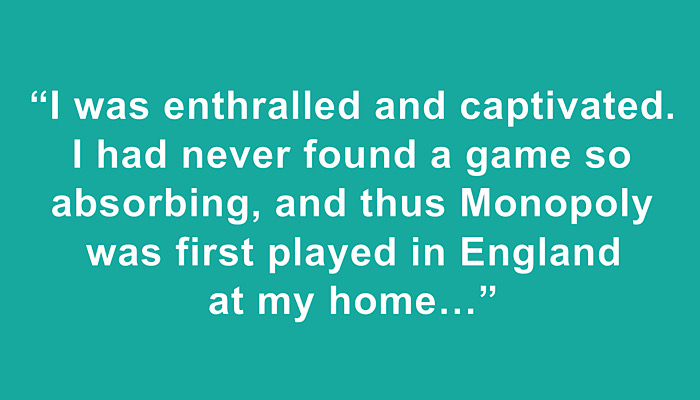
Worth saying that we’re going to do a piece on Monopoly at 90… I’ll link to that here… Today, though, the story is about to be interrupted by the Second World War. And Maggie, we’re now going to talk about how Waddingtons got involved with MI9… Let’s whet people’s appetite, though! What’s the essence of the story?
Maggie: It’s the amazing-but-true story of how a division of the British Secret Service asked Waddingtons to help them during the war… And how Waddingtons hid special escape equipment inside Monopoly sets to help free prisoners of war!
Perfect! It’s such an incredible story; I really want more people to hear about it… Your play, a documentary, a film – got to be done! So I’ll also link to that here. And the Second World War also causes a delay to the release of a game Waddingtons want to put out: Cluedo! That’s somewhere in the pipeline. Meanwhile, there’s an extraordinary story involving a character from earlier – Bernard Westall.
Claire: From Danny La Rue…
Ha! From Danny La Rue! And I mention this because that story says something about Victor Watson’s tremendous character. In 1941, the De La Rue factory got bombed in the London Blitz. How did your dad tell this story, Amanda?
Amanda: According to my dad, my great-granddad was staying in London when this bombing happened. As soon as great-grandad heard the news, he made his way to the De La Rue factory. There, he found Bernard Westall and some employees salvaging what they could from the factory. There and then, Victor Senior said something to the effect, “We can’t have the Germans interfering with our rivalry! For as long as the war lasts, De La Rue can have half of Waddingtons playing-card production.”
Alistair: And he really meant it. He’s also quoted as saying, “For every one pack of cards we produce for of Waddingtons, we’ll produce one for De La Rue.”
Right! And this is Victor Senior’s attitude toward a company that tried to sue him! I think it’s wonderful! And did Victor keep his word?
Alistair: Oh, yes! They agreed to form a business called the Amalgamated Playing Card Company. And in fact, it wasn’t just playing cards. Waddingtons also took on responsibility for printing some of the bank notes that De La Rue did. The arrangement lasted in one form or another until 1962.

Absolutely amazing. So! The war ends. Then – finally – Cluedo launches in 1949. Again, it warrants an article all of its own… I’ll put in link to a piece about Cluedo at 75 here. But Waddingtons continues to expand and diversify. What kind of things do they create, Alistair?
Alistair: By then, Waddingtons Games had done a number of early card and board games with some success: Monopoly, Totopoly, Sorry… But these made up only a small part of the business’s profits. As a printer, they’d also worked to create leak-proof containers for milk and frozen foods, labels for Heinz, and the packaging for lightbulbs and Easter eggs.
So after the war, Waddingtons carries on going from strength to strength – and it passes to the next generation… And the next! Amanda, when did your father start running the company?
Amanda: Well, keep in mind that he started working there in 1951. He was on the shop floor sweeping up! He always claimed he was rather good at it… But he became chairman in 1977. He stayed in that role until he retired in 1993.
And Beric ran Waddingtons Games for about seven years… Of which, I did an interview with the terrific Robin Black, a former product developer at Waddingtons Games. People can read that here. She told me how brilliant your dad was, Alistair… Which is not to detract from your dad, Amanda… Because I think it’s fair to say that Waddingtons glory days were under Victor Junior’s stewardship. He was an extraordinary leader and – in my opinion – turned Waddingtons into a behemoth…
Amanda: It’s nice to hear you say that!
Am I wrong, Claire? Do I lie?!
Claire: No, he was great!
Because I think by the time Victor Junior became Chairman, Waddingtons was already a great brand. They made really tough decisions when they needed to, but they always had their heart on their sleeve and their values in their vision. To the point that they fought off a very hostile takeover bid from the ever-repugnant Robert Maxwell… Twice! Which made your dad a champion of the people, Amanda…
Amanda: And, you know, he worked tremendously hard to be able to do that. He had to go around all the major shareholders and convince them they shouldn’t sell. Neil Pullan was very supportive. His building company owned about half of Leeds – and it’s still a massive property-development business today. He was a good friend of my dad, and said to him: “Whatever it costs, Victor.”

And do you know why your dad and Neil Pullan felt so strongly about this?
Amanda: I think it was partly gut instinct. But also – by then – a man called David Perry had come along. He was the MD. Long story short: I think Perry worked for Maxwell for a time – so Perry knew what a bastard Maxwell was.
Oh, good lord! In all our texts and conversations, Amanda, that’s first time I’ve heard you swear! Ha!
Amanda: Ha! Well, if there’s one person we can feel comfortable calling a bastard…
Ha! Yes, you’re right – actually, bastard is rather tame! Maxwell was an odious bully. Claire, coming back to you… Totally unrelated! You worked your way up to become PR Manager of Waddingtons. That means you were responsible for two of the biggest board games of all time: Monopoly and Cluedo.
Claire: Yes…
Much pressure?!
Claire: Ha! It had its moments. But I got my job, really, because Beric and Victor were so close to Monopoly and Cluedo. They asked me to take over the PR and run all the championships and so on… So while there was some pressure in that respect, in others it wasn’t as much as you might think – because there was so much support from Beric and Victor. For me, looking after those two brands was a bit was like protecting special diamonds – the jewels in the crown of Waddingtons.
Lovely! And I know Monopoly has some controversy around who invented what… But that, I gather, was more on Parker Brothers than Waddingtons. After the Cluedo inventor died, though, Waddingtons did get a bit of flak for not looking after him… Did you have to handle that?
Claire: Yes. But that was with hindsight… The inventor – what was his name?
The inventor of Cluedo?
Claire: Pratt!
Alright… I only asked!
Claire: Ha! I’m just saying… Ha! Very good!
You set ’em up, Claire, I’ll knock ’em down! Anthony Pratt, you were saying…
Claire: Yes. I was reading about him quite recently. He was a musician, I think, before the war. And I can remember reading that he brought Cluedo to Waddingtons in the late forties – and Waddingtons eventually bought him out. That was only controversial after the fact. Some people looked back and said it was an unfair deal – but at the time he was happy with the offer.

Yes, my understanding is that he was pleased with it at the time. But, of course, no one knew that Cluedo was going to become this massive IP, with all these spinoffs and licenses. And I do wonder if – had it been left entirely to the inventor – it would’ve fallen over…
Claire: And in that respect, it was Waddingtons that actually made it what it was. If the inventor had carried on doing what he was doing with it, you and I might never have heard of it. So yes, I had to handle a slight controversy over that after he died. One of the newspapers called and said, “How do you feel? Knowing the inventor died a pauper?”
Oh, gosh! What on earth did you say?
Claire: “I’ll get back to you!”
Ha! That’s a very good answer – to an enormously unfair question…
Claire: Well, anything like that – questions that included a national newspaper – I had to get clearance for.
Quite right. But he didn’t die a pauper; that’s not true… He just didn’t earn as much as he could have. It was enough to buy a large house. My understanding is that he was quite phlegmatic about it. His wife was more peeved, I think.
Claire: Is that right?
I believe so. Their daughter, Marcia Davies, spoke to that effect. I’m guessing if you can take one step back from it, you end up asking whether it was a bad decision rather than an injustice. But, as I say, I’m trying to find Marcia Davies – Anthony Pratt’s daughter… If I do, I’ll do an interview – and people can read it here.
Claire: I wonder if it’s a case of hindsight being a wonderful thing. Because developing a game is expensive and difficult… Making it, promoting it, advertising it and creating the actual brand. So yes… It’s a great game. But it could just as easily, as you rightly say, have fallen over.

Well, I should also say that we’ve put up an article celebrating Cluedo at 75… So I’ll put a link to the piece in here. I’m also looking to get an interview with Anthony Pratt’s daughter, Marcia Davies… if that happens, I’ll put in a link to it here In the meanwhile, Claire, I just want to expand on something you said. You would’ve been around, would you, for the TV version of Cluedo?
Claire: Yes, very much so. In fact, ITV coming along in the early 1990s and asking if they could turn Cluedo into a game show really raised its profile. Obviously, it was already the quintessential murder mystery – everybody loved it. But the TV show really took it up a gear. And the marketing director at the time knew it would be gold in terms of advertising – because we’d get much more out of it than whatever the license fee was…
Yes, because they effectively paid you a license fee to create – what? 24 half- hour adverts for Cluedo?!
Claire: Exactly. Ha! I think there were 25 in all, because there was a Christmas special. But yes, four series of six half-hour episodes. And ITV promised us they’d use A-list TV celebrities as the characters. And they did! I mean they had Joanna Lumley as Miss Scarlett. Koo Stark played her as well. June Whitfield was Mrs. White…
Brilliant! So was Joan Simms… Was Jerry Hall Miss Scarlett in one series?
Claire: Yes; they really kept their word about the celebrities – although that sparks my memory! They used Leslie Grantham as Colonel Mustard one year. By that time, the show was doing well – we were getting loads of publicity. But I do remember coming back from the filming on location at Arley Hall, which is near Manchester. Obviously, we didn’t have mobile phones in those day, so only when I got back to the office did somebody tell me that The Sun had called…
The Sun – for our overseas readers – is a very popular national newspaper here. One that – well, it likes a bit of a gossip, I think it’s fair to say! Ha!
Claire: Ha! Well, I can remember the show was going on air on the Monday night. And this was the previous Friday. So when I got back to the office, one of the team said to me, “The Sun wants to talk to you about the Cluedo TV show…” So I just thought, “Great! More publicity!” So… Ha! Are you laughing because you know what’s coming?

Ha! Yes!
Claire: Well, I took the call, and this journalist said, “What have you got say about having a murderer playing one of the key suspects in a murder-mystery show?”
Oh dear, oh dear! Because that was the extraordinary thing: Leslie Grantham – an enormously popular actor during his stint in the soap opera EastEnders – had, in fact, committed a murder in his youth… Went to prison for it, served ten years… It just took ages to come out as a story! So what on earth did you say?
Claire: “I’ll get back to you.”
Ha! And did it do any damage? Did it hurt sales of the game? Or viewing figures of the show?
Claire: No, not at all… Not at all. It was just a good story for the press. If anything, it might have made more people watch it. And remember: that format sold around the world. There were a number of foreign editions of it.
Well, look… We’re coming up on our 20th hour together. Ha! Goodness knows how we’re going to edit this down! Let’s start wrapping it up. I know you can still buy Waddingtons Number 1 playing cards. Winning Moves still distribute that brand. But what actually happened to Waddingtons?
Amanda: Well, from my own personal perspective, things started to change – understandably – after my dad retired. The people remaining didn’t necessarily have that feeling of passion we spoke about earlier… The camaraderie; the loyalty to the company. And it sort-of went down the pan a bit I think. Eventually, the printing division got bought out by a company called Communisis. They went bust quite recently. My Uncle John was speaking about this the other day…
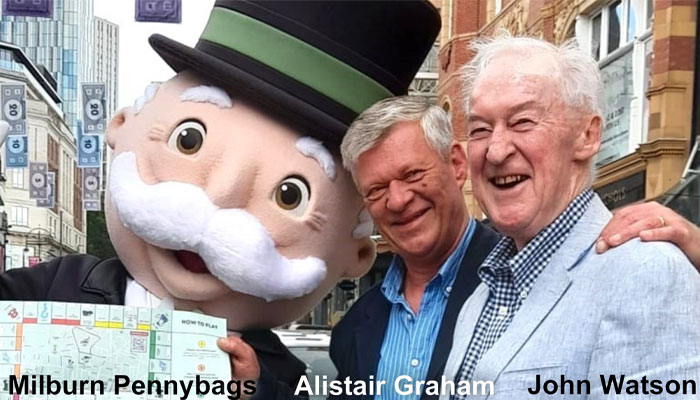
That’s John Watson… He hasn’t come up much in this chat, but he was the youngest brother; he was involved in the company on and off…
Amanda: Yes. He also had a tremendous career away from Waddingtons. After he was the MD of the games company, he became a Member of Parliament. When he stopped that, he came back to Waddingtons as a director. He left again in 1989 I think. And Waddingtons Games was later bought by Hasbro.
And there are two reasons we’re doing the interview now… First, so that we can really celebrate Monopoly with this massive takeover in Leeds! I’ve done an interview with Martin Dickson from LeedsBid about that. People can read it here, or in our sister magazine Brands Untapped, here. Second, to get everything ready in time for the 30th anniversary of Hasbro buying Waddingtons Games!
Maggie: Is it really 30 years?! I suppose it is…
I’m afraid so! And we’re basing that on the date of 30th November, 1994… Which is when – and I’ll quote from your dad’s book, Amanda: “Waddingtons announced the sale of Waddingtons Games to Hasbro for £50 million.” Now the reason this is of particular interest to me, Claire, is that there seems to be a Prattesque irony to the price Hasbro paid!
Claire: In what way? That it was considered a high price at the time?
Quite so! Waddingtons were thrilled with it! But now if you look at it – in the context of what Monopoly and Cluedo have done since – £50 million looks like an absolute bargain.
Claire: Yes, you’re absolutely right! And what I said about Anthony Pratt not being able to do what Waddingtons did is true here, too… Waddingtons simply couldn’t have done what Hasbro have done with Cluedo or Monopoly…
Can you give me an example of that?
Claire: The best example is probably the licensed versions of Monopoly. Victor and Beric were very protective of the game itself… Victor didn’t want to do the Star Wars edition of Monopoly, for example. He was very anti that kind of licensing; he worried it would dilute the brand. So Victor was trying to protect what had been – and what he saw as the current incarnation of Monopoly. Through no shortcoming of his own, he just couldn’t see what the future was. He just wasn’t wired to see Darth Vader on it.

He sees Pall Mall, not Darth Maul…
Claire: Obviously I’m not an expert in any sense, but I think maybe none of the old guard could see it. But Hasbro? Well, they had a very clear vision of what they wanted to do with it. And after Hasbro did the Star Wars edition, Monopoly just exploded. As you know, there are dozens and dozens and dozens of licensed versions… And that’s not to mention all the versions Winning Moves do for the individual regions. So yes – to answer your question, I think everyone would agree: Hasbro got an absolute bargain.
Amazing. Final thoughts are on the Leeds takeover! Here we are, sitting not 50 yards from a giant Monopoly dog! There are eight incredible Monopoly playing-piece models, quizzes, displays and story-time sessions… There’s Monopoly-money bunting in the high street; there are banners, posters, gonfalons and oriflammes everywhere! My days! Monopoly is all over Leeds! How does it feel when you see all this?
Alistair: Ha! Well, it feels like it’s come home really, doesn’t it? It might be London Street names that are on the first Waddingtons-made boards, but Leeds is Monopoly’s spiritual home. And you can feel that… There’s something so familiar about it.
Maggie: Yes, it’s amazing. I know Monopoly is still very much alive and kicking, but it is wonderful that this takeover is happening in its UK birthplace. So it does feel really lovely, and the family was invited to the launch and fed in various snippets of information… John Watson made a little film – it’s nice that they’ve involved us.
Claire: It’s wonderful. Very heartening to see!
Amanda: It’s been great – my dad would be thrilled to see it; he would’ve loved it. And it’s been great to do this as well, Deej – all of us being together and talking about Waddingtons. Thank you.
Oh, gosh; no – on the contrary; thank you all for making time! What can I say? You’ve given me such wonderful insights and memories. Just as importantly – it’s been terrific fun! And what’s the time now? Just coming up on four in the morning, so still time… Ha! Still time for me to sprint round all the sculptures and catch the evening train!
–
To stay in the loop with the latest news, interviews and features from the world of toy and game design, sign up to our weekly newsletter here





